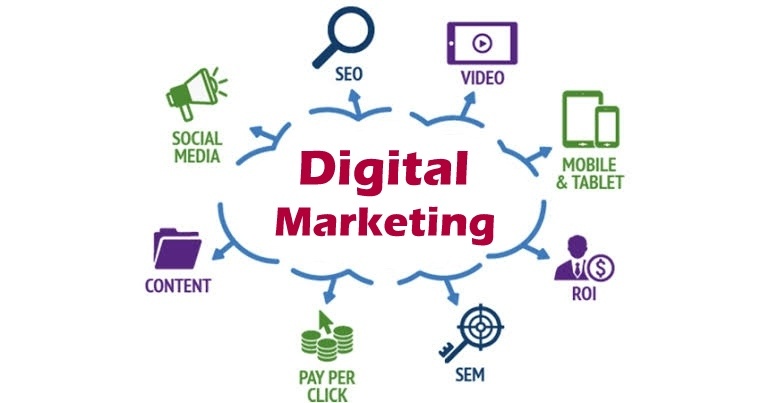What is digital marketing?
Digital marketing encompasses all of a company’s efforts to communicate with customers using electronic technology. Digital marketing advertises and sells items or services to prospective clients via online channels like email, social media, mobile marketing, online customer communities, webinars, and other video-based content.
Traditional marketing techniques are utilised in the digital marketing process. As a strategy, organisations might blend traditional and digital marketing approaches.
Importance of digital marketing
Due to the internet’s global reach, digital marketing enables a company to appeal to a considerably bigger audience than it could using traditional marketing tactics. This marketing strategy also allows businesses to target prospective clients who are most likely to make a purchase. For instance, a business can promote holiday specials by emailing previous clients or by posting about the deals on social media.
Organisations can reach out to customers through a variety of online channels, including emails, social media, text, banner adverts, and affiliates.
Social media facilitates interaction and communication between individuals and organisations. Similarly, marketers may use these platforms to acquire insights from their target demographic and enhance customer engagement by connecting with them. Digital marketing methods are easily adaptable to changing circumstances. The platform and format of communication can be altered, for instance, if the target audience changes platforms,for example:
Digital marketing has gotten more difficult as a result of the proliferation of new communication channels, as well as the analysis necessary to make sense of customers, prospects, and their preferences. To comprehend the behaviour and preferences of customers, prospects, and leads, organisations utilise a range of analytical techniques. From social media listening to predictive analytics and big data analytics, businesses utilise a range of tools to comprehend customer responses to their digital marketing initiatives.
Types of digital marketing
Numerous manifestations of digital marketing exist, including the following:
Email marketing: With the intention of promoting current business activities such as sales or events, organisations reach out to clients and potential customers via email.
Social media marketing: Organisations utilise social media marketing on platforms such as Facebook, Twitter, and Pinterest to engage and communicate with customers and prospective customers, as well as to inform them of promotions and establish social trust.
PPC (pay-per-click) advertising: PPC advertising enables businesses to place paid advertisements on many websites. A banner ad is an example of such an advertisement. If sufficient data or cookies are acquired about a user, these advertisements can be targeted based on attributes such as age, gender, location, and general interests. Each time a user clicks on the ad, the publisher is compensated.
Content marketing: This digital marketing strategy employs content to reach customers. Content refers to anything that a company creates and publishes on a website with the intention of promoting it through other marketing channels, such as social media or email.
Sponsored content: A company pays another group to develop and disseminate material that promotes the marketer’s product.
Affiliate marketing:A company pays an influencer on a particular platform, such as YouTube or Instagram, a commission to promote its product or service.
Short Message Service (SMS) marketing: SMS messages may be used by organisations to deliver promotions to clients. Candidates for political office frequently send SMS texts as part of their campaign efforts.
As firms attempt to reach a greater spectrum of potential customers and link customer behaviour to potential new purchases, marketing automation software has become increasingly vital to digital marketing. Organizations use marketing automation, for instance, to track visitor behaviour on their websites and then target those visitors to potentially sell things.
Inbound marketing vs. digital marketing
Inbound marketing is a technique that focuses on recruiting customers through the usage of internet content provided by the organisation. The objective of inbound marketing is to attract customers to the firm, as opposed to competing for their attention.
Examples of inbound marketing content and tactics include the following:
blog posts
photos
infographics
videos
podcasts
presentations
e-books
e-newsletters
webinars
search engine optimization or SEO
social media marketing
Digital marketing makes no distinction between inbound and outbound tactics, whereas inbound marketing does. Digital marketing is the umbrella word for all forms of marketing that include a digital outreach.
Inbound marketing targets clients via online channels, such as social media and search engines, and aims to develop content that appears in these locations to drive organic traffic to a company’s website.
Outbound marketing can possibly reach a larger audience, but it carries the danger of bombarding consumers who are not interested. Inbound marketing is intended to target interested prospects via audience segmentation, but by its very nature, it may reach a much smaller pool of prospective clients.
Existing client retention is also an essential application of inbound marketing. Creating more frequent communications with customers and enabling firms to engage with customers through the provision of useful, instructive content and promotions helps retain client interest.
B2B vs. B2C digital marketing
Business-to-business (B2B) digital marketing focuses on online lead creation with the objective of locating a business willing to purchase the product.
The objective of business-to-consumer (B2C) digital marketing is to attract and convert individuals into consumers. B2C digital marketing places greater emphasis on accelerating the buyer’s journey for customers.
The decision-making process for B2B clients is often lengthy, as it includes input from multiple parties. B2C clients, on the other hand, require only their own input and may base their purchasing decisions on sentiment or mood. B2C customers may also respond better to social media marketing or email digital marketing’s limited-time deals and offers.
Digital marketing benefits
Benefits of digital marketing include the following:
Global and local reach:Individuals in various time zones or around the globe can view the same advertisement. Digital marketing also increases the visibility of local adverts, allowing businesses to modify their locally targeted advertisements.
Targeting specific audiences:Customers and potential customers can maintain contact with brands via email and social media platforms, where companies can then converse with them or test offers to get insights.
Cost-effectiveness:Digital marketing is less expensive than traditional marketing methods such as television advertisements. Promotion through email campaigns and social media is nearly free.
Customised channels:Digital marketing channels can be sold in a variety of ways, depending on the organisation and the platform on which it operates. Marketing teams within a firm are able to identify and change their most effective and efficient marketing strategies.
Digital marketing challenges
Time-consuming:It takes time for businesses to consistently produce content and optimise their marketing strategies.
Competitive:This might arise when potential clients are bombarded with too many competing advertisements. It can be tough for marketers to make their product stand out.
Data privacy:If a business is using an individual’s data to target them for advertising, then it should understand how to handle that data and obey data privacy rules.
Technology:Digital marketers must ensure that websites are optimised for mobile users so that a prospective customer’s journey from learning about an organisation to making a purchase is streamlined.
Read More :- https://wishmatv.com/technology/technology-careers/

Bimal Mardi is a Professional Content Writer. He works in First Santal Broadcast Network TV/ News channel in India. Bimal Mardi writes about Technology, Education and Tech Product Reviews




